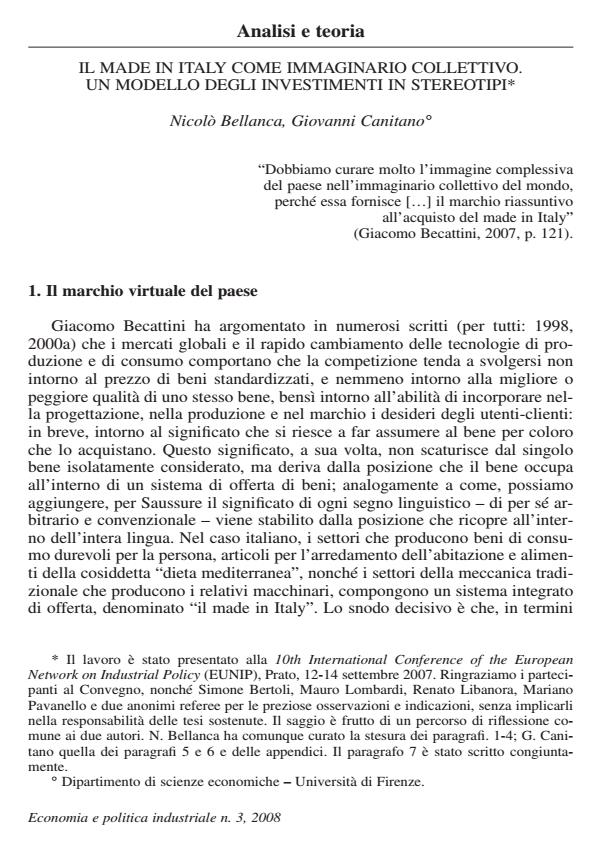Il made in Italy come immaginario collettivo. Un modello degli investimenti in stereotipi
Titolo Rivista ECONOMIA E POLITICA INDUSTRIALE
Autori/Curatori Nicolò Bellanca, Giovanni Canitano
Anno di pubblicazione 2008 Fascicolo 2008/3 Lingua Italiano
Numero pagine 25 P. 155-179 Dimensione file 654 KB
DOI
Il DOI è il codice a barre della proprietà intellettuale: per saperne di più
clicca qui
Qui sotto puoi vedere in anteprima la prima pagina di questo articolo.
Se questo articolo ti interessa, lo puoi acquistare (e scaricare in formato pdf) seguendo le facili indicazioni per acquistare il download credit. Acquista Download Credits per scaricare questo Articolo in formato PDF

FrancoAngeli è membro della Publishers International Linking Association, Inc (PILA)associazione indipendente e non profit per facilitare (attraverso i servizi tecnologici implementati da CrossRef.org) l’accesso degli studiosi ai contenuti digitali nelle pubblicazioni professionali e scientifiche
Made in Italy as a collective belief. A model of investment in stereotypes - This article interprets the phenomenon of the made in Italy as a collective belief. First, a conceptual framework is proposed for analysing the formation and evolution of collective beliefs, by characterizing precisely the way individuals are expected to behave in this respect. Then, we argue that different paths may end up provoking the emergence of a collective belief, and maintain that the made in Italy can be thought of as the case of a collective belief about the inventive and creative Italian way of producing a specific set of goods. Afterwards, we point to the investment in public rituals as the way to actively foster this collective belief, and then interpret such process as an economic problem of providing a public good. We highlight the main collective action implications of such analysis, by showing individuals’ behaviour in different settings. The analysis is focused on those characteristics that make the made in Italy a special public good, such as joint private benefits, asymmetries between agents, and accession costs. Finally, policy implications are explored, in terms of redistribution and proactive subsidization. Keywords: collective beliefs, competitiveness, impure public goods JEL classification: D21, H41, R38;
Nicolò Bellanca, Giovanni Canitano, Il made in Italy come immaginario collettivo. Un modello degli investimenti in stereotipi in "ECONOMIA E POLITICA INDUSTRIALE " 3/2008, pp 155-179, DOI: